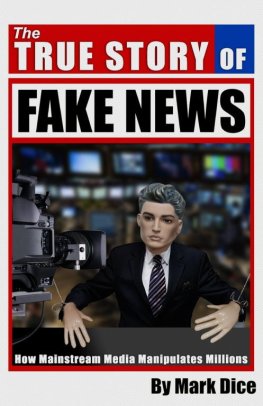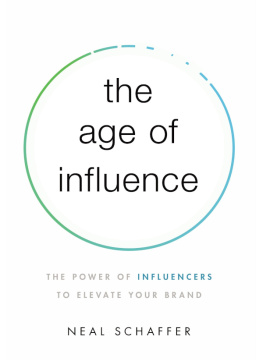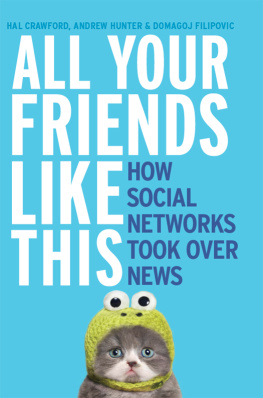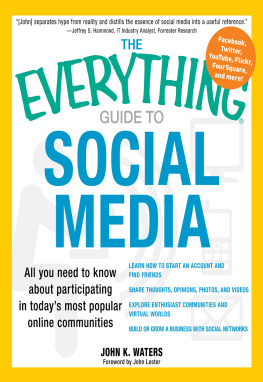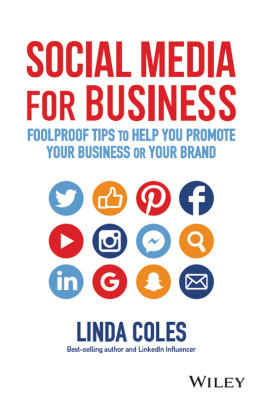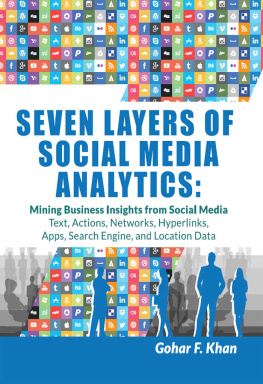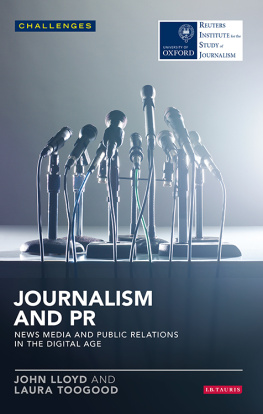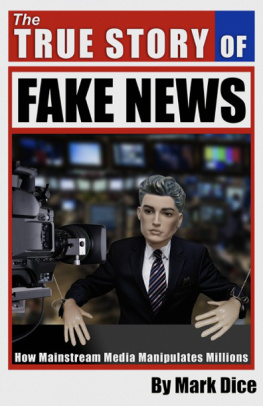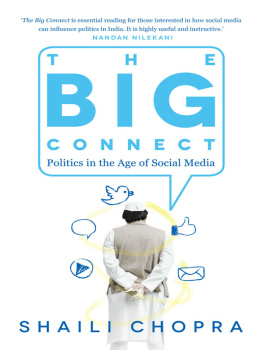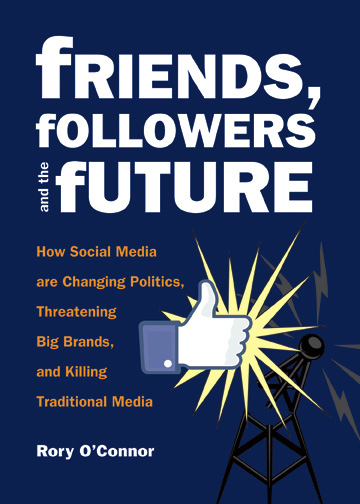Rory OConnor - Friends, Followers and the Future: How Social Media are Changing Politics, Threatening Big Brands, and Killing Traditional Media
Here you can read online Rory OConnor - Friends, Followers and the Future: How Social Media are Changing Politics, Threatening Big Brands, and Killing Traditional Media full text of the book (entire story) in english for free. Download pdf and epub, get meaning, cover and reviews about this ebook. year: 2012, publisher: City Lights Publishers, genre: Politics. Description of the work, (preface) as well as reviews are available. Best literature library LitArk.com created for fans of good reading and offers a wide selection of genres:
Romance novel
Science fiction
Adventure
Detective
Science
History
Home and family
Prose
Art
Politics
Computer
Non-fiction
Religion
Business
Children
Humor
Choose a favorite category and find really read worthwhile books. Enjoy immersion in the world of imagination, feel the emotions of the characters or learn something new for yourself, make an fascinating discovery.

- Book:Friends, Followers and the Future: How Social Media are Changing Politics, Threatening Big Brands, and Killing Traditional Media
- Author:
- Publisher:City Lights Publishers
- Genre:
- Year:2012
- Rating:5 / 5
- Favourites:Add to favourites
- Your mark:
Friends, Followers and the Future: How Social Media are Changing Politics, Threatening Big Brands, and Killing Traditional Media: summary, description and annotation
We offer to read an annotation, description, summary or preface (depends on what the author of the book "Friends, Followers and the Future: How Social Media are Changing Politics, Threatening Big Brands, and Killing Traditional Media" wrote himself). If you haven't found the necessary information about the book — write in the comments, we will try to find it.
Theres a revolution going on, as ever-accelerating developments in digital information technologies change nearly every aspect of how we live, work, play, do business, and engage in politics. Share and share alikethe numbers say it all as billions of people worldwide flock to online media and use social networks to discover and spread news and information.
In the process, ever-growing networks of ordinary people are using these powerful new tools to trim the influence long held by Big Business, Big Government, and Big Media. No longer just passive recipients, participants in social networks now regularly make and break news while organizing civic and political actions that bypass censors, outpace traditional media, attract massive audiences, and influence the rise and fall of brands, industries, politicians, and even governments.
In this insiders look at how social media are transforming our world, Rory OConnor explains the trends and explores what tech visionaries, media makers, political advisers, and businesspeople are saying about the meteoric rise of the various social networks of friends and followers, and what they bode for our future.
Rory OConnor is one of the smartest media guys around. He knows whos spinning, whos pandering, and whos putting money in his own pocket at the expense of logic, reason, and the public good.Michael Wolff, Vanity Fair media critic
This is a timely book about a vital subject: How do we get information and is it reliable? With a cold eye, author Rory OConnor shows how traditional journalism cheapened its value by sabotaging its trust, and how the digital revolution wonderfully democratizes information yet often removes the journalistic curator, creating more noise, more ME and less WE news. If you want to understand the future of news, its opportunities and its pitfalls, read this book. Ken Auletta, author and New Yorker media writer
If Glenn Beck keeps a J. Edgar Hoover-esque blacklist under his bed pillow, journalist Rory OConnor is probably on it, appearing before Nancy Pelosi and George Soros. OConnor turns a skeptical yet pragmatic eye to the likes of Facebook. He examines how such online networks empower citizens to create counternarratives to bullsh*t punditry, political spin, and corporate PR, while warning of the dystopian echo chamber they could realize, where every citizen becomes a bullsh*tting pundit, partisan hack, or corporate flak. SF Weekly
In his lucid examination of the effects of digital technology, the author asserts that the evolution of web-based platforms and the rise of the Occupy movement has caused a marked decrease in our cultures dependence on traditional models of organization . . . OConnor pulls no punches and effectively tracks the gains and losses of the movement in clear, energetic language. An erudite, constructive analysis.Kirkus Reviews
Rory OConnor, co-founder of MediaChannel.org, is the author of Shock Jocks: Hate Speech & Talk Radio. He has won two Emmys and a George Orwell Award, among many other honors.
Rory OConnor: author's other books
Who wrote Friends, Followers and the Future: How Social Media are Changing Politics, Threatening Big Brands, and Killing Traditional Media? Find out the surname, the name of the author of the book and a list of all author's works by series.

